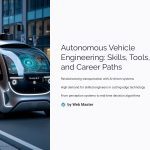 Autonomous vehicles are revolutionizing transportation, and the demand for skilled engineers is skyrocketing. From AI-driven perception systems to real-time decision-making algorithms, autonomous vehicle engineers work on cutting-edge technologies that power self-driving cars. Whether you’re an aspiring engineer or a professional looking to transition into this field, this guide will walk you through the skills, tools, and career paths needed to excel in autonomous vehicle engineering.
Autonomous vehicles are revolutionizing transportation, and the demand for skilled engineers is skyrocketing. From AI-driven perception systems to real-time decision-making algorithms, autonomous vehicle engineers work on cutting-edge technologies that power self-driving cars. Whether you’re an aspiring engineer or a professional looking to transition into this field, this guide will walk you through the skills, tools, and career paths needed to excel in autonomous vehicle engineering.

What Does an Autonomous Vehicle Engineer Do?
Autonomous vehicle engineers design, develop, and test self-driving car systems. Their responsibilities vary depending on specialization, but they typically include:
- Developing computer vision algorithms for detecting objects, pedestrians, and traffic signals.
- Implementing machine learning models for predictive analytics and decision-making.
- Working with LiDAR, radar, and cameras to build robust sensor fusion systems.
- Creating path planning and motion control algorithms for safe navigation.
- Ensuring vehicle safety and compliance with regulatory standards.
- Testing and optimizing autonomous driving software using simulators like CARLA and Gazebo.
Autonomous vehicle engineers work in collaboration with roboticists, AI researchers, software engineers, and mechanical engineers to create reliable self-driving technology.

Essential Skills for Autonomous Vehicle Engineers
To succeed in this field, you need expertise in several key areas:
1. Programming & Software Development
- Proficiency in Python, C++, and ROS (Robot Operating System) is crucial.
- Experience with deep learning frameworks like TensorFlow or PyTorch.
- Understanding of real-time systems and embedded software development.
2. Machine Learning & AI
- Training neural networks for perception and control.
- Using reinforcement learning for behavior prediction.
- Working with large datasets for sensor fusion and decision-making.
3. Sensor Technology & Robotics
- Hands-on experience with LiDAR, radar, and camera calibration.
- Implementing sensor fusion algorithms for accurate environmental perception.
- Understanding robot kinematics and dynamics for motion planning.
4. Simulation & Testing
- Using simulators like CARLA, Apollo, or Gazebo to test autonomous systems.
- Implementing hardware-in-the-loop (HIL) and software-in-the-loop (SIL) testing.
- Analyzing log data from real-world test vehicles.
5. Automotive Industry Standards & Safety
- Familiarity with ISO 26262 (Functional Safety for Road Vehicles).
- Knowledge of SAE levels of automation and regulatory requirements.
- Ensuring cybersecurity in autonomous vehicle networks.

Best Tools and Frameworks for Autonomous Vehicle Engineering
Working in this field requires mastering industry-standard tools and frameworks:
1. Software & Development Frameworks
- ROS (Robot Operating System): Standard for robotic software development.
- Autoware & Apollo: Open-source autonomous driving platforms.
- TensorFlow & PyTorch: AI and deep learning frameworks.
2. Simulation & Testing Platforms
- CARLA: Open-source simulator for autonomous driving.
- Gazebo: 3D robotics simulator.
- LGSVL Simulator: High-fidelity simulation for self-driving car testing.
3. Hardware & Sensors
- NVIDIA Drive PX: AI computing platform for self-driving vehicles.
- Velodyne & Ouster LiDAR: Leading LiDAR sensors for environmental mapping.
- Intel RealSense & ZED Cameras: Depth sensing cameras for perception.

Career Path: How to Become an Autonomous Vehicle Engineer
1. Get a Strong Educational Background
- A degree in computer science, electrical engineering, robotics, or mechanical engineering.
- Specializing in AI, machine learning, and automotive technology.
2. Gain Hands-on Experience
- Work on open-source projects like Autoware and Apollo.
- Participate in autonomous vehicle competitions (e.g., SAE AutoDrive Challenge).
- Develop projects using simulation platforms.
3. Earn Certifications & Training
- Take courses on self-driving car engineering from Udacity, MIT, or Stanford.
- Get hands-on experience through internships at Tesla, Waymo, or NVIDIA.
Check Udacity’s Self-Driving Car Course

Job Opportunities and Salary Expectations
Top Companies Hiring Autonomous Vehicle Engineers
- Tesla – Full Self-Driving (FSD) and Autopilot teams.
- Waymo – Google’s self-driving technology company.
- Cruise – GM’s autonomous vehicle division.
- Aurora Innovation – AI-driven autonomous vehicle solutions.
- Apple – Developing autonomous driving technology.
Salary Range
- Entry-Level: $90,000 – $120,000 per year.
- Mid-Level: $120,000 – $160,000 per year.
- Senior-Level: $160,000 – $220,000 per year.
Autonomous vehicle engineers are in high demand, with salaries often exceeding six figures, especially for professionals with expertise in AI and robotics.

Future Trends in Autonomous Vehicle Engineering
The future of autonomous driving is evolving rapidly, with exciting advancements on the horizon:
- Level 4 & Level 5 Autonomy: Fully autonomous vehicles with no human intervention.
- AI-Powered Decision Making: Smarter AI models for enhanced driving safety.
- V2X Communication: Vehicles communicating with infrastructure and other cars.
- Robotaxis & Autonomous Delivery: Companies like Cruise and Zoox expanding self-driving services.
- Sustainability & Electric Vehicles: Autonomous and electric technology merging for a cleaner future.
The autonomous vehicle industry is set to grow exponentially, making it a lucrative career choice for aspiring engineers.
*Capturing unauthorized images is prohibited*



